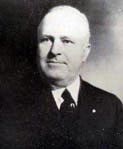
Algernon B. Chandler, Jr.1919 - 1928
Serving initially as professor of Latin, Algernon B. Chandler’s contributions to the growth and development of the Fredericksburg State Normal and Industrial School for Women were such that after just three years, he was promoted to dean, and in 1919 was named president. Just before he assumed the presidency, the governing board of the Virginia normal schools resolved to eliminate unnecessary duplication of specialized departments. Consequently, the Fredericksburg Normal School, under Chandler’s administration, developed an assigned four-year commercial course and offered the only physical education major within the state normal school system of the 1920s.
In 1924, the General Assembly altered the school’s name to the Fredericksburg State Teachers College. In accordance with this change, Chandler strengthened admissions standards to require that applicants either graduate from accredited high schools or successfully pass entrance examinations. The previous high school curriculum offered at the school was replaced by a two-year teaching certificate program and a four-year program granting a bachelor’s degree in education. As a result of these programs, Chandler sought to improve the facilities for student teaching, by first initiating cooperative agreements with the city and various rural county school systems, and later by establishing the Campus Training School. Housed in the appropriately named Chandler Hall, this school enrolled more than 400 students from elementary through high school levels and provided practical teaching preparation.
During Chandler’s tenure, the student body grew from the initial 110 students to more than 500. He doubled the size of the faculty and enlarged the two-building campus, adding an open-air theatre, a student activities building, and a new unit to Virginia Hall. Also, the Betty Lewis Apartments on Sunken Road were leased for dormitory purposes. Chandler impacted residential life in other ways with rules and regulations that affected virtually all activities, from hours of study, relaxation, and sleep, to walks on campus, trips to town, and conduct on dates. “Lights out” was at 10:45 p.m. every night, with a preceding study period on weeknights. On weekends, dates were required to leave by 10 p.m. Chandler also followed his own rigorous schedule, one filled with numerous responsibilities which had a pronounced effect on his health. At age 58, he suffered a fatal attack of apoplexy on his way home from work, and he died on September 10, 1928.
The years preceding his service to the institution confirmed Chandler’s capabilities as a scholar, educator, and administrator. Born in Bowling Green, Va., in 1870, he attended the University of Virginia for his undergraduate and graduate degrees. Following his studies in Charlottesville, he studied law at Washington and Lee University, after which he joined his brother in Atlanta to practice law. After just a few years, however, Chandler abandoned the legal profession to pursue his interests in the education field. His teaching career began in private schools, and he entered public school work as principal of the Clifton Forge Grade and High School. He also served as superintendent of the Richmond Public Schools, professor of English at the Virginia Mechanics Institute, and as a conductor of the state Summer School for Teachers in Fredericksburg. In the year prior to joining the faculty of the Normal School, he was the Virginia State School Examiner. In addition, he wrote the Virginia Supplement to Frye’s Grammar School Geography, edited the school page of the Richmond News Leader, and served as president of the Virginia Teacher’s Association.
